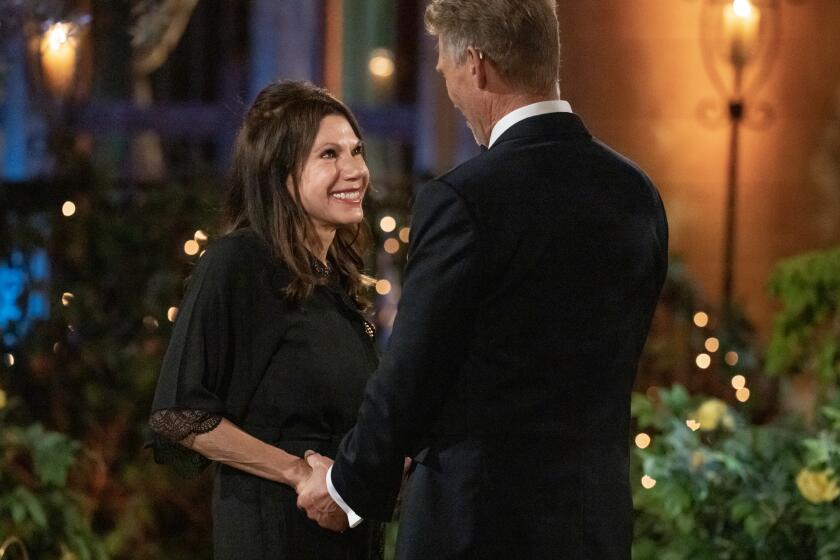The end nears for Walter White of ‘Breaking Bad’
Most Hollywood creative types won’t openly judge their characters. Judgment, the reasoning goes, corrupts honest, organic storytelling and alienates the modern audience, which sniffs out the invariably distorted and preachy tale.
Tell that to Vince Gilligan, the creator and executive producer of “Breaking Bad,” who believes his main character, high school chemistry teacher turned meth dealer Walter White, should go straight to hell. That is, if there is one.
“I’ve got to believe there’s a hell because I can’t stand the thought of Adolf Hitler, Pol Pot and Idi Amin, you pick your poison, dying in some bed with satin sheets in Saudi Arabia,” Gilligan said over a recent late lunch at his Burbank offices. “I just can’t stand the idea of these people going unpunished.”
EMMY BALLOT: Vote for your favorite shows
White, the compelling central figure played by Bryan Cranston in AMC’s Emmy-winning show that wraps up its penultimate season Sunday, can’t match the body count of such infamous company — yet. But give him time, there’s that unexplained M60 machine gun in his trunk revealed in this season’s premiere episode, and he still has the finale and the show’s final season next year to pull the trigger.
The 45-year-old show runner of one of television’s most elite dramas sat down to discuss White’s ultimate fate and this season’s twists and turns, which have generated a ratings jump of more than 30% compared with last year and some of the most watched episodes the series’ history. The show opened its fifth season in July to its largest audience, some 2.9 million viewers, and then eclipsed that record once again in last week’s installment that killed off a fan favorite — an oddly admirable drug henchman who is gunned down by White.
But murder has never been the destination of “Breaking Bad,” it’s merely a blood-soaked and frequent pit stop on White’s road to perdition. The bolder-than-ever and rising drug lord is consumed in this season’s eight episodes by his personal journey — a creeping, black-tar metamorphosis from “Mr. Chips to Scarface,” as Gilligan has often said.
This season also demonstrated the wild imagination (gigantic magnets destroy computer evidence), the dark humor (any scene with Bob Odenkirk’s sleazy attorney), the masterful plotting (desert train heist) and the pathos (an innocent boy is gunned down) that recently earned the show 13 Emmy nominations, the most in its five seasons. Widespread critical acclaim and binge viewing on streaming video services like Netflix have fueled the show’s remarkable surge in popularity and ratings — despite a notable loss of viewers from the Dish Network, which has dropped AMC in a protracted dispute.
Gilligan, the native Virginian whose accent is fading after a couple of decades in the West, hasn’t lost his Southern manners. Polite, unpretentious, curious, with an easy laugh, Gilligan is quick to deflect credit for the show’s success and its much lauded ability to weave weighty philosophical issues with riveting narratives, often with a winking absurdity.
And despite his years in Hollywood, Emmy night, which is Sept. 23, can still rattle him.
“I get very nervous,” said Gilligan, who has seen Cranston pick up three awards for lead actor. “I’m always surprised and never take it for granted, but nothing will ever top that first year. That knocked me out of my chair. When Bryan won, I screamed out in joy from the audience and in one breath I screamed myself hoarse.”
Gilligan could be hoarse for a while based on Cranston’s performance this season, when his character rushes to embrace his inner evil.
Having disposed of his drug dealer boss in dramatic fashion last season, White — once a mild-mannered, middle-aged science geek — is hellbent on expanding his power. He’s not just in the meth and money business, he boldly states. He’s into empire-building.
That drive, however, led to a lethal confrontation with Mike Ehrmantraut, who begrudgingly became a business partner of White’s this season. The ex-Philly-cop-turned-bad-guy character was beloved by “Breaking Bad” fans who hated to see him go — almost as much as Gilligan hated to tell the actor, Jonathan Banks, his time was up.
“He was not happy. He said he was going to punch me in the heart,” said Gilligan. “He says that a lot, though. He’s actually a very sweet guy.”
The series’ celebrated intricacy and precision have always invited intense speculation about what it all means. This season, for instance, there seemed to be an unusual number of references to and images of bugs — flies, termites, silverfish, tarantulas and others. (A “bugging” device is even installed in a Drug Enforcement Administration office.)
Sometimes, it does mean something. Sometimes, not.
“If I were smart, I’d smile knowingly and say, ‘What do you think?’” said Gilligan, who worked on the sci-fi thriller “The X-Files” for seven years. “I have to admit a lot of the patterns people see I’m unaware of until they air.... But sometimes the fly in the episode is just a fly in the episode, it just worked out that way.”
It’s no accident, though, that White is convinced, and even openly acknowledged in last week’s episode, that he is going to hell. Is there anything a man who has murdered and poisoned children could do to redeem himself?
“That’s the $64,000 question,” said Gilligan.” “Redemption is a pretty tricky thing. You’d have to be pretty saintly to say that Walter White could be redeemed at this point. I don’t think I’m saintly enough to say that.”
Judgment day arrives next summer when AMC will air the show’s final block of eight episodes. Naturally, Gilligan wouldn’t reveal much about what’s coming. The writers have been talking about the series finale since November but gathered face to face to break down the story only in early August.
So far, they have the broad strokes of the ending but still have “the blanks to fill in,” he said.
“We’ve got some ideas for the last eight episodes that frankly trouble me and worry me,” he said. “I worry the audience won’t stay on board with some of them. But this show demands dramatic moments and moments of shock and surprise and showmanship, and I want to carry that through to the bitter end — if indeed it is a bitter end.”
Clues to the series’ final outcome can perhaps be gleaned from Gilligan’s general views about endings. One of his favorites in movies and literature is Francis Ford Coppola’s “Apocalypse Now” and the book it was loosely based on, Joseph Conrad’s “Heart of Darkness.” The main character Kurtz, at the last, finally realizes how far he’s fallen and what he’s truly done.
“I’m not saying there is an ending like that in the offing for Walter White,” he said. “But as I sit here talking about it, it certainly would make sense on some level.”
Gilligan admires the close of “MASH” most. It delivered the feeling of inevitability that is essential for a satisfying conclusion, he said. The characters on the show wanted to go home, and they ultimately did.
“The worst ending for MASH would have been a surprise ending, which is you’re never going to see them go home,” he said. “That the war is going to on for eternity. You want to see them go home even though it’s the thing you most expect.”
As Gilligan plays God with White’s fate, he’ll look to his metaphysical and moral beliefs for guidance.
“I want to believe there is some sort of cosmic balancing of the scales at the end of it all,” he said. “I’d just like to believe there’s some point to it all. I’d like to believe that there is. Everything is just too random and chaotic absent that.”
ALSO:
‘Breaking Bad’ and the Gus Fring issue
Bryan Cranston and other top Emmy Award picks
Aaron Paul says he’ll be a ‘sobbing mess’ when ‘Breaking Bad’ ends
PHOTOS, VIDEO AND MORE:
PHOTOS: ‘Dancing With the Stars: All-Stars’: Meet the cast
London Olympics: The Games, our way
VIDEO: Watch the latest fall TV trailers here
More to Read
The complete guide to home viewing
Get Screen Gab for everything about the TV shows and streaming movies everyone’s talking about.
You may occasionally receive promotional content from the Los Angeles Times.






